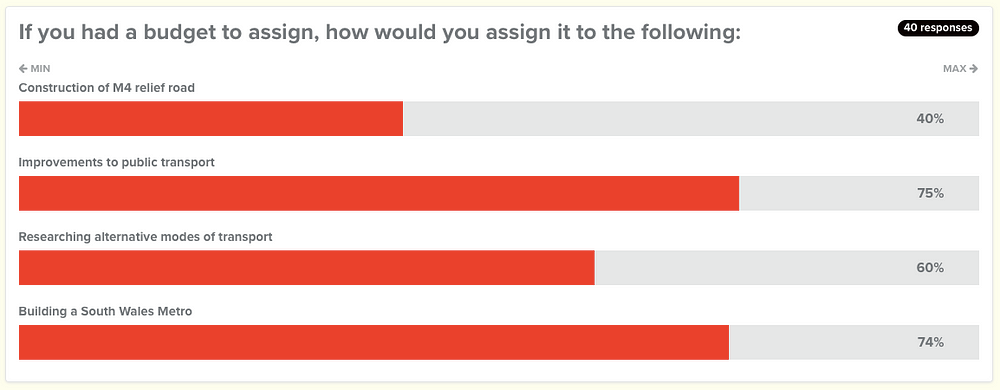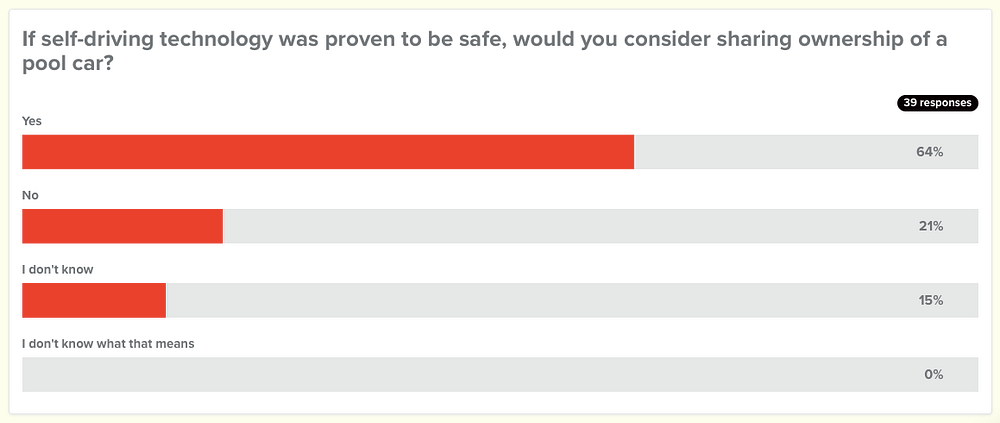Marc Thomas explores the nuances of asking what people really think – in this case about transport in south east Wales – and then what you do with that data
There is currently much discussion about the future of travel in South East Wales. The progression of Government policy and discussion of infrastructure projects in the City Deal have brought the conversation to the forefront.
I’ve been involved in a lot of discussions in various different settings and with various groups about this and the way that the public are looking at changes happening in the world, both locally and globally.
So, the other day, I asked a couple of questions to people on various social media channels through the software platform that I cofounded, doopoll.
doopoll is designed to help disengaged people engage very easily and to provide a lightweight way to get a large group of people to participate in a discussion with as little effort as possible. This seemed like a great opportunity.
First we’ll take a look at some of the results from the survey and offer up some observations about those and then some wider observations about the region and country to finish.
People are pretty sure that we should be investing in infrastructure for car/lorry travel.
A key policy of the Government is the creation of a relief road for the M4 to ease some of the traffic problems that people are experiencing in that area.
The policy has been in the works for a very long time but has been hotly contested and opposed along its life for a number of reasons.

It makes sense to me that a relatively good number of people supported the building of roads. The traffic that people experience around Newport on the M4 is horrific.
And so a straight yes/no answer could probably be forecast to be a ‘yes’ for ‘we should build a relief road.’
When you propose alternatives to car/lorry travel, that changes people’s opinions
One of the features of the conversations around infrastructure and travel in South East Wales is that you must also factor in the lifespan of the improvements.
When the relief road conversation has been happening since the 90s, you have to imagine that the lifespan of any roads built would be future-loaded to a significant degree.
Given that there are looming changes to transport technology and changes of social attitudes, it made sense to offer people a variety of different options with regards to transport. Here’s how that looked:

The ranges on those options are also significant in my opinion. In fact, every option that people could vote for had a range of 0–100% which probably demonstrates that these options are polarising.
Using doopoll’s new context answer feature, I was able to gather a variety of text comments on this question as well.
Generally, the comments on this can be categorised into the following groups:
Concerns about South Wales Valleys
Respondents who left comments about the need to connect Cardiff and the South Wales Valleys generally voted quite highly for the options around the metro and public transport and very lowly on the M4 relief road options:
I think it’s really important to improve rail links to all our valleys allowing people to move faster in and out of cities and reducing house building on the cities green belts. This should focus on faster rail services before roads.
And this one:
Metro system would [get people] into e alleys communities and ease roads for commuters to cardiff (sic.)
These are legitimate concerns which have already been raised to some degree by the Cardiff Capital Region Growth and Competitiveness Commission as well as Plaid Cymru.
Attracting inward investment and regional growth
Much has been said about the need for inward investment into Wales as well as jobs for semi- and skilled workers.
This seems to be convergent with the comments from the second group of respondents to the poll.
The number of people that require a car because of the flexible mobile nature of their jobs it is hard to see how public transport can be a solution for the majority of people. If we want to attract inward investment from larger companies we need a reliable road system to provide stability for their usage.
And more generally about growth and connectivity with other large population centres nationally:
Wales needs faster, more efficient trains going to/from London Bristol and better road links, however Cardiff desperately needs the Metro brought in because the city cannot cope with the growth in population and building without much better transport links.
As well as this one which is more specifically related to Cardiff’s development plans:
Cardiff Bus have a near monopoly on buses and provide garbage service. Trains are unreliable and antiquated. Even if these services were improved, the routing through Cardiff is dire. Metro is promising, a well thought out “alternative” travel may also work — tram. The road infrastructure of Cardiff cannot cope with the city growth.
Future proofing the decisions we make now
The third group of commenters is comprised of those who are in favour of exploring alternate modes of transport but did not seem to voice a concern for the South Wales Valleys as their main reason for doing so:
For infrastructure, it makes sense to take the long view. Automation could have a huge impact on how people use transport. Any decisions made now should really consider the impact/benefits automation brings.
Interestingly, there was only one comment that suggested that cycling could be an option. This is perhaps understandable given the wider distances being discussed in the questions but worthwhile considering nonetheless:
More than 50% of car trips in cities are less than 5 miles, a distance that can easily made by bicycle in less that 30 minutes. A comprehensive network of protected cycle tracks could be produced in every large city in Wales for a fraction of the cost of a motorway relief road.
People feel sceptical about the possibilities of car ownership decreasing
A key factor to consider in debates around future proofing is the growing body of automotive industry experts and executives who are suggesting that self driving cars may begin to corrode individual car ownership in the near future. Here’s an interesting report by McKinsey on that topic if you’re interested.
I thought the best way to phrase a question about this would be to get an individual’s perspective. So I asked:
A lot of people believe that individual car ownership will decrease within the next 15–20 years. How likely do you think this is for you?

I was quite surprised to find that given the answers to the previous question, people thought that it was 57% likely they would stop owning a car in 15–20 years time.
However, as with the ranges of opinion on the previous question, there were some people who could not see this happening at all, and others who could absolutely see it becoming a reality.
Contrast the above answer with the response to the question below though and something quite fascinating happens:

It struck me as a really interesting twist that although people couldn’t agree on whether or not there was going to be a decrease in car ownership, they were very open to the possibility that they wouldn’t own their own car outright.
What does this all mean though?
Getting data is great but knowing what the data are saying is a whole different bag of apples/kettle of fish/pair of shoes.
So what are the data saying in this case?
Before I tell you what I think, I’d just like to point out that this is the response of 40 or so people. I think it’s really important that this kind lightweight consultation work becomes the norm for local government and national government over the next few years.
There are a number of big policy projects in Wales which are going to require buy in from the public at large rather than a tranche of public sector and big business in Wales. Well-being of Future Generations Act is particularly good at recognising this as is the City Deal but it is must become the norm rather than the exception to produce attractive ways to participate rather than the stale old inpenetrable policy consultation delivered through anti-user friendly platforms like SurveyMonkey or SnapSurveys.
Now that that’s out of the way.
The data collected show, for me, that Wales is facing a diverse set of problems in this small area alone:
- Concerns about the well-being of communities outside of Cardiff
- Worry about how to ensure that big businesses are investing inwardly
- Questions on what the future of Wales is
And it’s on this last point that I think there is the most significant work to be done.
Wales seems to be at a crucial moment where it decides what direction to take. Along with the rest of the world, we are facing huge geopolitical issues such as population change, political upheaval and disruptive technology.
The interesting responses that came back on the topic of self-driving technology and car ownership are indicative of a wider trend and, I will have to assume until a larger data set is available, of at least a good portion of the local population.
Wales has the opportunity to excel in so many technological fields and develop its already formidable soft power. The notable technological breakthroughs in solar technology, advanced compound semi conductors as well as digital media businesses such as Periscope (acquired by Twitter, cofounded on Ynys Môn), show just what Wales is possible of in terms of technological advancement.
But the results from the end of the spectrum which suggest that road building and individual car ownership are key seem to point to a certain degree of scepticism or innocence with regards to the possibilities that technological changes could bring when applied to civic problems.
The challenge is: how do we sustain the population in the short term while building for the future? What interventions can happen today to pave (maybe literally) the way for the next 50 years?
And more than all of the questions which we must answer, I think the crucial thing is this: when do we confront the issue that at some point, we will need to explain to the guy on the street that the way Wales has been is probably not the direction that it is heading and how can we do that in a way that ensures we take as many people with us as possible?
If you have any thoughts about this, I would love to hear them. You can write to me at [email protected]






It would be interesting to see how the results of this survey connect with two consultation processes currently underway by the Welsh Government, namely – Policy Discussion to Improve Local Bus Services in Wales, and the Design of Wales and Borders RaiI Service.
Joining the dots in the discussion of public/private transport and regional accesibility is a difficult enough task, but it might be worth a try.